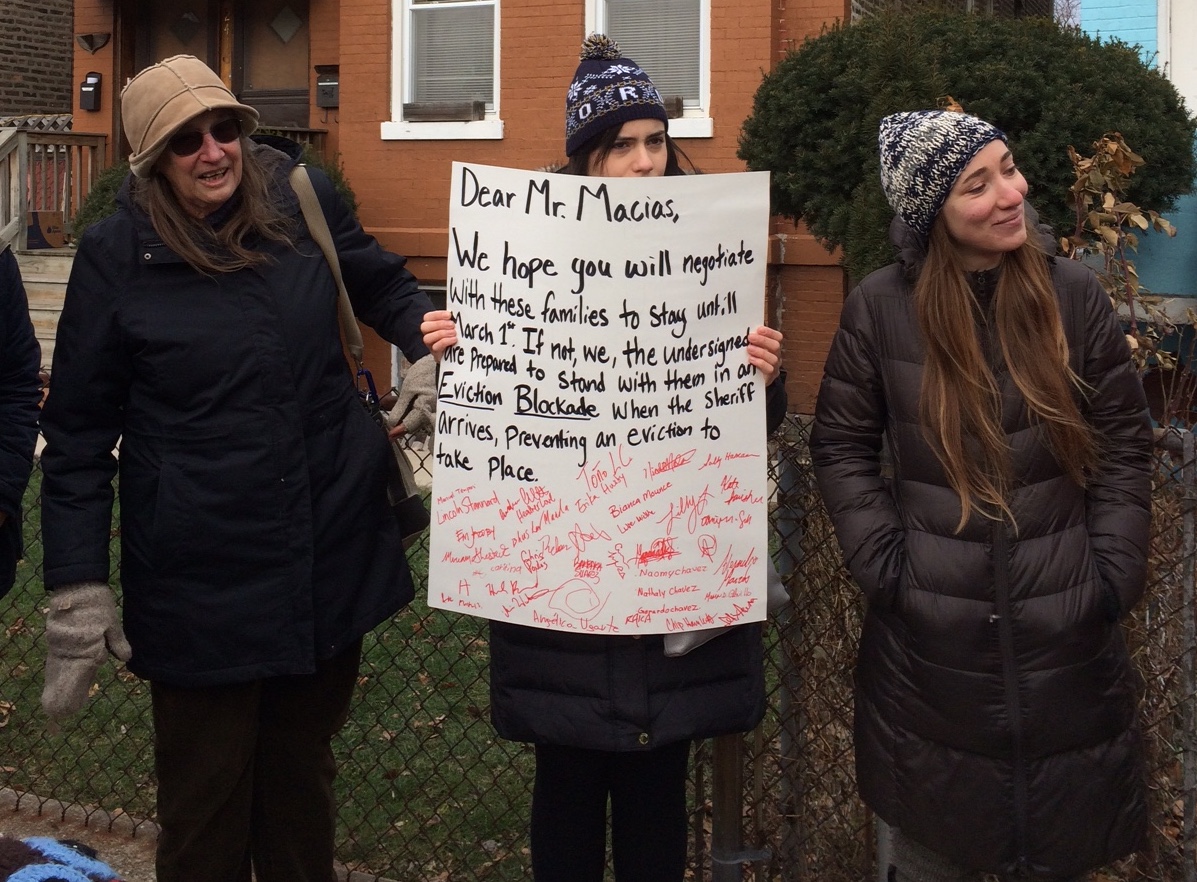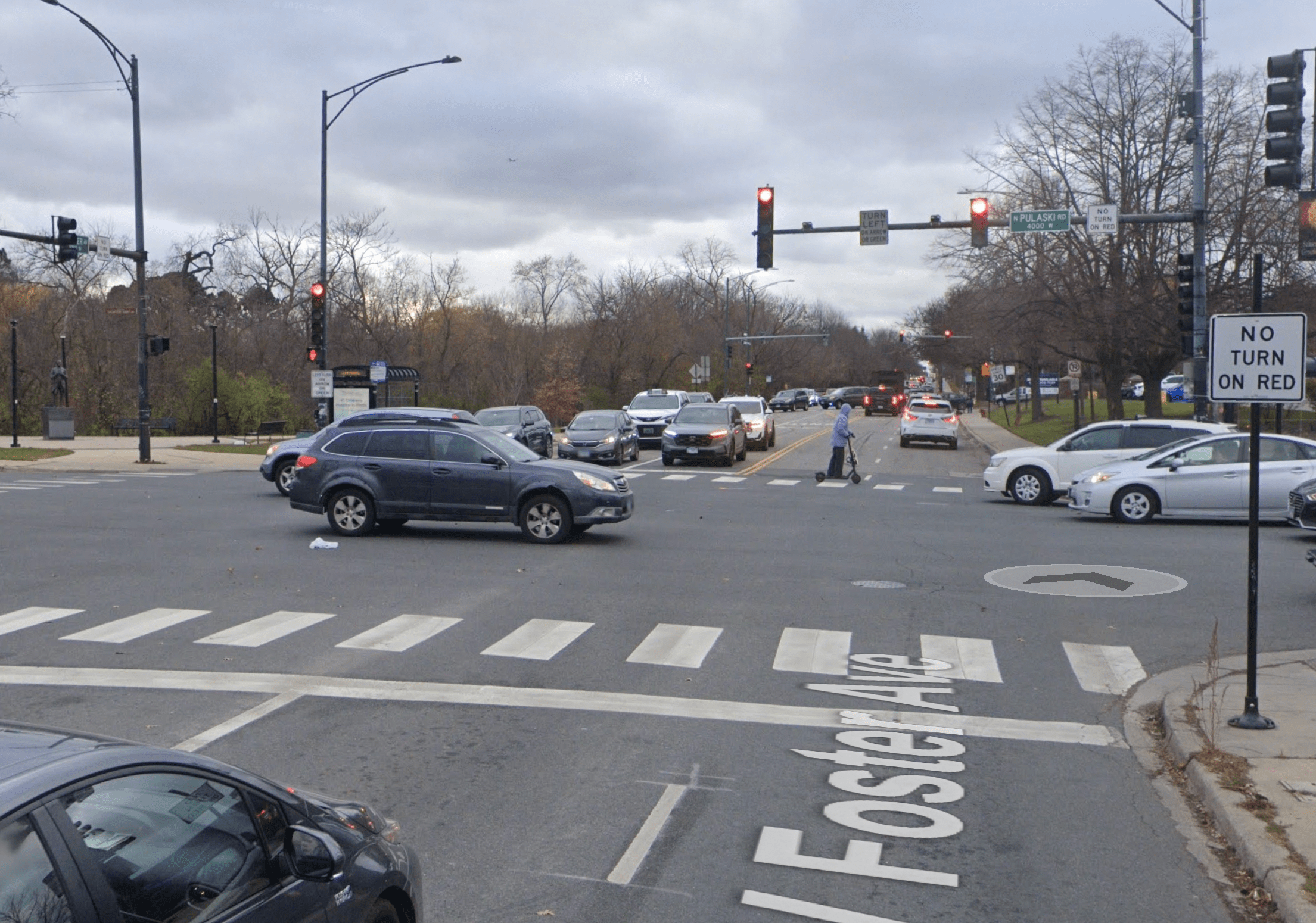Before ringing in the new year, at least thirty longtime Logan Square residents and affordable housing activists turned out for a rally near the California Blue Line station organized by the Autonomous Tenants Union and Somos Logan Square, calling on a local landlord to stop blocking a proposed relocation agreement that would help his low-income tenants, who are being forced out of his building by plans for a transit-oriented development, find new homes.
Landlord Francisco Macias owns the six-unit building at 2340 North California, which, along with a car wash, is slated to be demolished to make room for an upscale, 138-unit transit-oriented development by Savoy Development. The new building, located a short walk from the ‘L’ stop, would include 20 affordable units and, thanks to the city’s TOD ordinance, only 44 on-street parking spaces.
The market-rate studio apartments will rent for $1,200 a month while one-bedrooms will go for $1,400. Sayoy owner Enrico Plati has not disclosed the rents for the affordable units, but according to city guidelines, they must be affordable to households earning up to 60 percent of the Chicago region’s area median income, or $43,440 for a family of four.
However, Macias hasn’t sold the existing building to Plati yet because of a conflict with his tenants, who were on month-to-month leases (which have been shown to make tenants more susceptible to evictions), and paying only $500 a month in rent. After Macias gave them 30-day notices to leave the building, in late September residents, supported by the activists, vowed to fight the evictions and stopped paying rent, arguing that they needed more time to find housing in the increasingly expensive rental market of Logan Square. After going to court over the issue, the building’s remaining three families were given until January 15 to move, but they say they need more time to find housing and financial assistance for the move.
After months of negotiation, the activists persuaded Plati to agree to the relocation agreement, which would give the families until March 1 to move, plus $2,500 per unit in financial assistance. It would also reimburse Macias for court costs, attorney fees, and the rent he wasn’t able to collect during the eviction process. However, Macias, has refused the deal because he claims the families still won’t move out in time and the sale of his property will fall through.

At Saturday’s rally, the tenants hoped to bring attention the ongoing negotiations and their struggle to find housing. The first to speak at the press conference was 12-year-old Natalie Ortiz, whose family has lived in the neighborhood for 11 years and is now facing eviction. With relatives by her side, she spoke about the difficulty of moving. “We are here today to ask Francisco Macias to give us more time to move,” she said. “It’s really hard to find affordable housing in Logan Square.” She added that their current apartment is close to her school, but leaving the neighborhood might force her to leave her school behind.
Natalie’s mother Glenda Ortiz elaborated on the challenges of finding housing her family can afford in Logan Square. “[It affects] not just me and my family, but others,” she said in Spanish. “It’s impossible to find affordable housing right now with security deposits too.”
After the press conference, the crowd walked southeast on Milwaukee Avenue to the supposed site of Macias’ home in an attempt to deliver a giant letter asking the landlord to give his residents until March 1 to move. “We have been trying to reach [Macias] for weeks, but he’s been evasive,” said Lilly Lerner, an organizer with the Autonomous Tenants Union. If Macias refuses, the letter states, will begin an ‘eviction blockade,’ a non-violent act of civil disobedience Chicagoans have used before to prevent evictions by the Cook County sheriff’s department.
When I contacted Macias, he reiterated that he doesn’t believe the tenants would follow through with the agreement to leave his building by the end of next month. He added that he believes the public hasn’t been sympathetic to his position as a landlord who has to pay property taxes but has been unable to collect rent for months. Plati did not immediately respond to a request for comment.
Regardless of whether Macias goes through with the relocation agreement, it's encouraging that Plati is willing to adjust his timetable, compensate the tenants for moving costs, and reimburse the landlord for his expenses. Hopefully this will set a precedent for future projects, and we'll see more TOD developers working with the community to help mitigate any potential negative affects of their plans. And hopefully this situation will help broaden the the conversation around TOD developments and affordable housing. Transit-friendly housing can be a great thing for all Chicago neighborhoods, but we need to move towards a model where new TODs are not seen as fueling the displacement of longtime residents.
Update 1/3/16 7:30 PM: DNAinfo is reporting that First Ward alderman Joe Moreno has threatened not to approve the required zoning change for the TOD unless Macias cooperates, which would effectively block the sale of the property. "By refusing to work with me on a resolution that would allow for a dignified and humane relocation of the tenants, [Macias] has chosen to pursue an opposite, heavy-handed tactic," Moreno said in a statement to DNA. "By doing so, he has revealed himself to be a bad community partner, who may no longer merit the granted city zoning privileges that are enabling the sale of his property on his terms," Moreno said.
Macias told DNA that whether or not the zoning change goes through, he would evict the tenants. He implied that if he can’t sell the building he will rehab the units in order to charge more rent because he can’t afford to keep charging sub-market rates.




